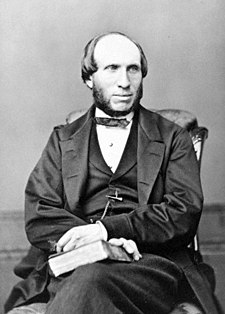
Sir John Struthers MD FRCSE FRSE (21 February 1823 – 24 February 1899) was the first Regius Professor of Anatomy at the University of Aberdeen. He was a dynamic teacher and administrator, transforming the status of the institutions in which he worked. He was equally passionate about anatomy, enthusiastically seeking out and dissecting the largest and finest specimens, including whales, and troubling his colleagues with his single-minded quest for money and space for his collection. His collection was donated to Surgeon's Hall in Edinburgh.
Among scientists, he is perhaps best known for his work on the ligament which bears his name. His work on the rare and vestigial ligament of Struthers came to the attention of Charles Darwin, who used it in his Descent of Man to help argue the case that man and other mammals shared a common ancestor ; or "community of descent," as Darwin expressed it.
Among the public, Struthers was famous for his dissection of the " Tay Whale", a humpback whale that appeared in the Firth of Tay, was hunted and then dragged ashore to be exhibited across Britain. Struthers took every opportunity he could to dissect it and recover its bones, and eventually wrote a monograph on it.

Sir John Struthers MD FRCSE FRSE (21 February 1823 – 24 February 1899) was the first Regius Professor of Anatomy at the University of Aberdeen. He was a dynamic teacher and administrator, transforming the status of the institutions in which he worked. He was equally passionate about anatomy, enthusiastically seeking out and dissecting the largest and finest specimens, including whales, and troubling his colleagues with his single-minded quest for money and space for his collection. His collection was donated to Surgeon's Hall in Edinburgh.
Among scientists, he is perhaps best known for his work on the ligament which bears his name. His work on the rare and vestigial ligament of Struthers came to the attention of Charles Darwin, who used it in his Descent of Man to help argue the case that man and other mammals shared a common ancestor ; or "community of descent," as Darwin expressed it.
Among the public, Struthers was famous for his dissection of the " Tay Whale", a humpback whale that appeared in the Firth of Tay, was hunted and then dragged ashore to be exhibited across Britain. Struthers took every opportunity he could to dissect it and recover its bones, and eventually wrote a monograph on it.